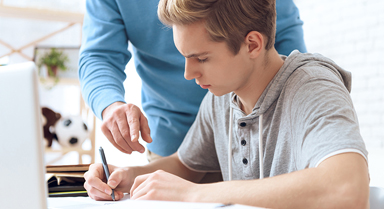What to know about cardiovascular disease
The term cardiovascular disease (CVD) refers to conditions and disorders that affect the heart or blood vessels. Many of these are related to atherosclerosis, the buildup of a substance called plaque in the walls of the arteries, causing narrowing or blockage of the arteries and restriction or complete cessation of the blood flow through the vessel. This can cause heart attacks or strokes.1,2,3
The causes of cardiovascular disease are complex and varied, but some lifestyle habits, including a poor diet, tobacco use, high alcohol intake, and physical inactivity, can increase associated risks.1,4
Did you know?
- Cardiovascular diseases are the leading cause of death globally.5
- An estimated 17.9 million people died from CVDs in 2019, representing 32% of all global deaths. Of these deaths, 85% were due to heart attack and stroke.5
- Over three quarters of CVD deaths take place in low- and middle-income countries.5
Types of cardiovascular disease
There are various types of cardiovascular disease. They include1,2,6,7,8:
- Coronary heart disease. When blood vessels carrying oxygen to the heart are narrowed or blocked, the heart is put under strain. A heart attack can occur when this happens suddenly; and heart failure can happen if the heart is unable to pump blood around the body as needed. Angina is pain in the chest and upper body caused by lack of blood flow to the muscle.
- Cerebrovascular disease (Strokes and TIAs). When blood supply to the brain is disrupted by blockages or clots, it can cause a stroke or a transient ischemic attack (TIA or mini stroke). They can also be caused by a cerebral aneurysm, when bleeding in the brain occurs from a rupture of a dilated and fragile vessel. The affected parts of the brain cannot function adequately, and bodily functions regulated by these damaged parts of the brain can be impaired as a result. Some effects are permanent, while others can be temporary.
- Peripheral arterial disease. This affects limbs, often the legs, when they receive insufficient blood because of arterial narrowing or blockages.
- Arrhythmia. Bradycardia, when your heart beats too slow, and tachycardia, when it beats too fast, can lead to your heart not functioning as well as it should, and not being able to pump as much blood as needed by the rest of your body.
- Aortic disease. The aorta is the body’s biggest blood vessel. It transports blood from the heart to the rest of your body. Diseases affecting the aorta include aortic aneurysms and aortic dissection.
- Heart valve and heart muscle problems (rheumatic or degenerative). Heart valves control the direction of blood in and out of your heart. Malfunctioning valves can lead to problems with circulation.
- Congenital heart disease. Structural malformation of the heart existing at birth.
- Deep vein thrombosis and pulmonary embolism. This is a condition where blood clots form in the leg veins, dislodge, and move to the heart and lungs.
Next steps
Learn more about cardiovascular disease, such as primary causes, prevention and treatment.
If you have questions about cardiovascular disease, contact your health care provider for advice and support.
1. Cardiovascular disease. NHS. https://www.nhs.uk/conditions/cardiovascular-disease/. Last reviewed April 22, 2022.
2. New report details what to know about cardiovascular disease symptoms. American Heart Association. https://www.heart.org/en/news/2022/08/18/new-report-details-what-to-know-about-cardiovascular-disease-symptoms. Published August 18, 2022.
3. Atherosclerosis. WebMD. https://www.webmd.com/heart-disease/what-is-atherosclerosis#1. Last reviewed November 1, 2021.
4. Cardiovascular risk factors. World Heart Federation. https://www.world-heart-federation.org/resources/risk-factors/. Accessed December 22, 2022.
5. Cardiovascular diseases (CVDs) Key facts. World Health Organization. https://www.who.int/en/news-room/fact-sheets/detail/cardiovascular-diseases-(cvds). Published June 11, 2021.
6. Focus on: Peripheral arterial disease. British Heart Foundation. https://www.bhf.org.uk/informationsupport/ heart-matters-magazine/medical/peripheral-arterial-disease. Accessed December 22, 2022.
7. What You Should Know About Cerebral Aneurysms. American Stroke Association. https://www.stroke.org/en/about-stroke/types-of-stroke/hemorrhagic-strokes-bleeds/what-you-should-know-about-cerebral-aneurysms. Last reviewed December 5, 2018.
8. Vascular Disease (Vasculopathy). Cleveland Clinic. https://my.clevelandclinic.org/health/diseases/17604-vascular-disease. Last reviewed March 22, 2022.
Offered by Cigna Health and Life Insurance Company or its affiliates.
This information is for educational purposes only. It's not medical advice. Always consult with your health care provider for appropriate examinations, treatment and health care recommendations.
This article serves only as a reference and is intended for informational purposes only. Nothing in this article constitutes legal, tax, financial planning, health or medical advice including diagnosis or treatment. Always seek the advice of your physician or other qualified health provider with any questions you may have regarding a medical condition. References to third-party organizations or companies, and/or their products, processes or services, do not constitute an endorsement or warranty thereof. Products and services may not be available in all jurisdictions and are expressly excluded where prohibited by applicable law. All group insurance policies and health benefit plans contain exclusions and limitations. For costs and details of coverage, contact a Cigna Healthcare representative.
Cigna Healthcare products and services are provided exclusively by or through operating subsidiaries of The Cigna Group, including Cigna Health and Life Insurance Company, Life Insurance Company of North America, Cigna Global Insurance Company Limited, Evernorth Care Solutions, Inc., Evernorth Behavioral Health, Inc., or through their affiliates and contracted companies.









































































































